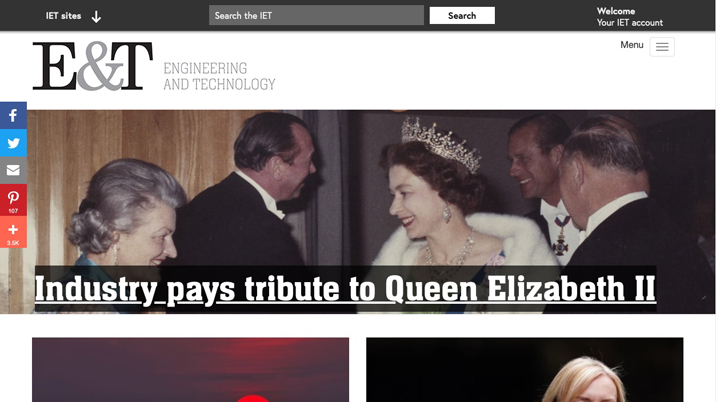
“Are we in a news blackout or something now then?” was the question from one of our journalists in the hours following official confirmation of the death of Queen Elizabeth II. “BAU for us,” I replied. How wrong I was.
Big national or international events can be tricky for specialist publications. The choice is to ignore and carry on with your own thing, or to adapt, adjust and follow the flow. Both have their risks.
Good niche publications don’t want to appear so obscure that they are wrapped up in their own little world. Specialist they may be, but not divorced from the real world, operating in another dimension, a sphere of their own, insulated from the world or national events on the wider news stage. But they can sometimes choose to ignore certain big events that don’t directly affect them and get away with it: the readers will understand. This didn’t seem like one such event.
The other option is to join the fray: find your own story angle or a different way of approaching it perhaps. If it’s something that’s in your own area, obviously you need to have your own take on it: an angle specific to your readers, providing more depth and insight than the wider media, or taking a particular stance.
One such world event was the Covid pandemic. But that was quite easy to find many angles on for specialist and general media alike. It affected everyone – that meant each and every reader whether they were working in hospitals, prisons, offices, schools or wherever. Your coverage simply couldn’t ignore it.
The death of the reigning monarch was trickier for our professional publication in the engineering and tech space, as I suspect it was for many other trade publications.
The vast majority of people in the world alive today have known only Queen Elizabeth on the throne, and probably 100% of working journalists.
I remembered the death of Diana, Princess of Wales, and what a strange week that was to be in specialist media. My trade weekly editor decided to more or less ignore it editorially, and I can’t see we could have done much else then. But that week, it felt you were in a parallel universe to the mainstream media. People only wanted to read about Diana and the fallout of the crash. I found it hard to believe that anyone was reading what we were reporting about the microelectronics industry although I suppose someone, somewhere, was.
But that was different to the death of a reigning monarch. Diana, by then divorced, wasn’t in line for the throne so there wasn’t quite the same protocol attached to the grieving period. This was different.
The BBC, as soon as the official announcement was made, went into national public broadcaster mode. It reported virtually nothing else for 24 hours, all of it carefully toned to be sombre, serious and respectful. Totally understandable, and it looked like other national media followed that lead. They knew what to do and of course had had long-standing plans ready to go.
A different perspective
When the news came, I was in Amsterdam for a trade conference and it was interesting tuning into European and American channels. Even for the channels in languages I didn’t speak, it was obvious the tone was quite different: it was another foreign news story, less sombre, more talk of the future King than the BBC had at that point. As well as images of the Queen, backdrop pictures included scenes of London, other royals and even on one Spanish channel a picture of Olivia Coleman as the Queen in The Crown. Whether they were discussing her portrayal or just pulled the wrong image from the picture library, I couldn’t work out in the absence of subtitles.
Trade and professional publications have wide and varied readerships. Within that readership, there will be those who are sensitive to the issue and would expect it to be marked in some way rather than just ignored. The majority of our readers are in the UK and the Queen was the patron of our publishing institution, which froze its websites with a memorial message at the top. But as a news site, wouldn’t it look odd if our magazine’s site did the same?
The timing was tricky for the print product. We had marked the diamond jubilee with features including the Queen’s use of various landmark technologies, like being the first monarch to send an email, but we’d done that and now the tone didn’t seem right anyway. If the cover hadn’t already gone to press, we might have considered running a memorial cover but we had nothing substantial inside to back it up.
Our compromise was the ‘industry reaction to…’ article. This can always be relied upon in a crisis. We were getting statements from other organisations in our area, plus some memories and messages from industry veterans. And as it happened, we were receiving notices from PRs of events cancelled, releases delayed, and generally it was turning into a quiet news day for anything other than this one, all-consuming momentous event. So, there was little else to report anyway.
By the Friday afternoon, we’d done just the one ‘industry tributes’ story, top of our home page and leading the daily news email. Many other trade, professional or specialist publications I noticed did something similar.
This wasn’t my first instinct. But to pretend nothing had happened and it was BAU would, for various reasons, have been wrong. So, on this occasion, I didn’t mind being proved wrong. There are rare occasions where it’s right just to stop, pause, take a step back and mark something important in whatever way you can. This was such a time. Seismic world events will throw us off BAU again in the future. But there will probably not be another quite like this one in my working lifetime. It’s a one-off. For a one-off Queen.
This article was first published in InPublishing magazine. If you would like to be added to the free mailing list to receive the magazine, please register here.












